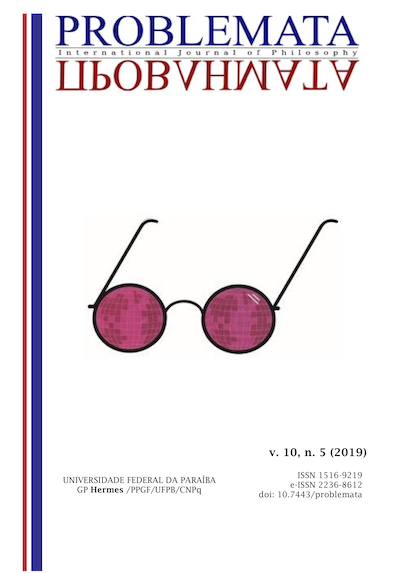IN DEFENSE OF PHILOSOPHY:
BETWEEN A POLITICAL POSITION AND PHILOSOPHY IN THE CLASSROOM
DOI:
https://doi.org/10.7443/problemata.v10i5.49662Keywords:
Philosophy teaching, Philosophy in Brazil, High school, Philosophy educationAbstract
In the Brazilian context, the place of philosophy in human education has gone through constant devaluation. A decade after its return as a mandatory school subject of basic education curriculum, there is no longer a concern in defending its presence as a disciplinary knowledge. The events of the present time have caused the emergence of a discourse already constructed in Brazil since the 1980s, in which the subject used to be thought as crucial to human education. This was due the peculiar qualities to the philosophical tradition, of criticism and resistance to the impositions of the present time. Although the importance of this political position is acknowledged, the goal of this paper is to problematize the only abstract construction of defending philosophy in the classroom, without thinking about the limits and possibilities of teaching and learning practices that cross the philosophy teacher’s education as well as the subject in basic education. Thus, it is argued that political engagement, in favor of the presence of philosophy, can only happen grounded on an investigation of the relationships that are established within the classroom, on behalf of philosophy as well as its teaching and learning.
Downloads
References
ARANTES, Paulo Eduardo. Um Departamento Francês de Ultramar: estudos sobre a formação da cultura filosófica uspiana. Rio de Janeiro: Paz e terra, 1994.
BRASIL. Congresso Nacional. Câmara dos Deputados. Padre Roque Zimmemann. Projeto de Lei 3178/1997. Altera dispositivos do art. 36. Da Lei n 9.394, de 20 de dezembro de 1996, que estabelece as diretrizes e bases da educação nacional - Brasília, DF, 1997.
BRASIL. Lei Federal nº 11.684, de 02 de junho de 2008. Altera o art. 36 da Lei no 9.394, de 20 de dezembro de 1996, que estabelece as diretrizes e bases da educação nacional, para incluir a Filosofia e a Sociologia como disciplinas obrigatórias nos currículos do ensino médio.
BRASIL. Secretaria de Educação Básica. Orientações Curriculares de Filosofia (OCEM). Brasília: MEC/SEB, 2006.
BRASIL. Secretaria da Educação Média e Tecnológica. Parâmetros Curriculares Nacionais: ensino médio. Brasília: MEC/SEMTEC, 2002.
GALLO, Silvio (coord). Ética e Cidadania: Caminhos da filosofia: Elementos para o ensino de filosofia. 15ª Ed. Campinas: Papirus, 2007.
GELAMO, Rodrigo Pelloso. Ensino da filosofia no limiar da contemporaneidade: O que faz o filósofo quando o seu ofício é ser professor de filosofia? São Paulo: Cultura Acadêmica, 2009.
GUIDO, Humberto; GALLO, Sílvio; KOHAN, Walter Osmar. Princípios e possibilidades para uma metodologia filosófica do ensino de filosofia: história, temas, problemas. In: CARVALHO, Marcelo; CORNELLI, Gabriele (Org). Ensinar Filosofia. Cuiabá: Central de Texto, 2013.
GOLDSCHMIDT, Victor. A Religião de Platão. Trad: Ieda e Oswaldo Porchat Pereira. 2ª ed., São Paulo: Difusão Europeia do Livro, 1970 [1953].
GUÉROULT, Martial. Lógica, arquitetônica e estruturas constitutivas dos sistemas filosóficos. Trad. Pedro Jonas de Almeida. Trans/form/ação, São Paulo, v. 30, n. 1, p. 235-246, 2007 [1957].
______. O problema da legitimidade da história da filosofia. Revista de História, São Paulo, v. 37, n. 75, p. 189- 211, 1968 [1956].
KOHAN, Walter. Perspectivas atuais do ensino de Filosofia no Brasil. In: FÁVERO, Altair Alberto; RAUBER, Jaime José; KOHAN, Walter Omar (Org.). Um olhar sobre o ensino de Filosofia. Ijuí: Unijuí, 2002. p. 21- 40.
KOHAN, Walter Omar; GALLO, Sílvio. Crítica de alguns lugares comuns ao se pensar a filosofia no ensino médio. In: KOHAN, W. GALLO, S (orgs). Filosofia no ensino médio. Petrópolis: Vozes, 2001.
MARQUES, Ubirajara Rancan de Azevedo. A Escola Francesa de Historiografia da Filosofia: Notas Históricas e Elementos de Formação. São Paulo: Editor
PLATÃO. Êutifon, Apologia de Sócrates, Críton. 4. ed. Lisboa: Casa da Moeda, 1983. Tradução, Introdução e Notas de José Trindade Santos
PRADO JÚNIOR, Bento. As filosofias da Maria Antônia (1956-1959) na Memória de um Ex Aluno. Maria Antônia: uma rua na contramão. São Paulo: Nobel, p. 66-81, 1988.
RODRIGUES, Augusto. Como nos tornamos os professores que somos: uma problematização da herança estruturalista nas práticas de ensinar e aprender filosofia. Dissertação (Mestrado em Educação)- Faculdade de Filosofia e Ciências, Universidade Estadual Paulista. Marília, 2019.
SOFISTE, J. A filosofia para crianças e o ensino de filosofia: Ética e filosofia política, v. 3, n. 2. Juiz de Fora: UFJF, 1998.
TOMAZETTI, Elisete M.. Produção discursiva sobre ensino e aprendizagem filosófica. Educ. rev., Curitiba , n. 46, p. 83-98, Dez 2012 .
UNESP. Projeto Pedagógico do Curso de Filosofia da UNESP, Marília, s/d, s/p. Disponível em: http://www.marilia.unesp.br/Home/Graduacao/Filosofia/projeto.pdf. Acesso em: 15 mar. 2019.
WOLFF, Francis. Sócrates — o sorriso da razão. Tradução de Franklin Leopoldo e Silva. São Paulo, Brasiliense, 1987.
Downloads
Published
Issue
Section
License
Authors who publish with this journal agree to the following terms:
- Authors retain copyright and grant the journal right of first publication with the work simultaneously licensed under a Creative Commons Attribution License that allows others to share the work with an acknowledgement of the work's authorship and initial publication in this journal.
- Authors are able to enter into separate, additional contractual arrangements for the non-exclusive distribution of the journal's published version of the work (e.g., post it to an institutional repository or publish it in a book), with an acknowledgement of its initial publication in this journal.
-
- Authors are permitted and encouraged to post their work online (e.g., in institutional repositories or on their website) prior to and during the submission process, as it can lead to productive exchanges, as well as earlier and greater citation of published work (See The Effect of Open Access).





